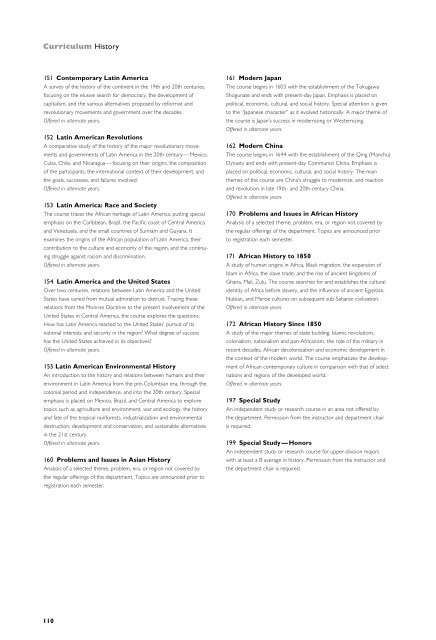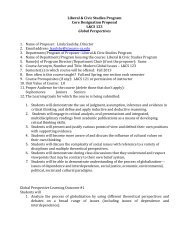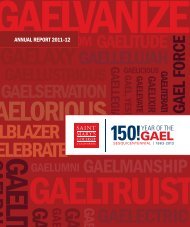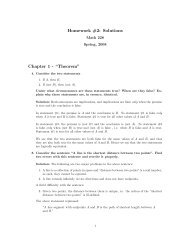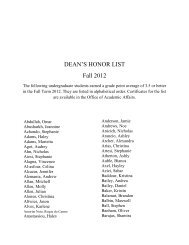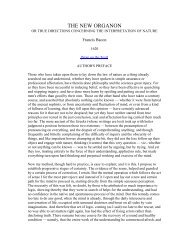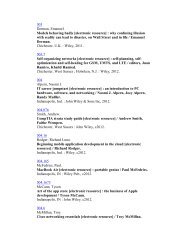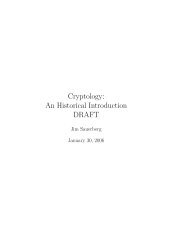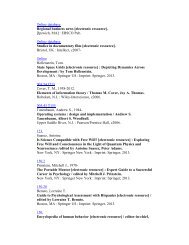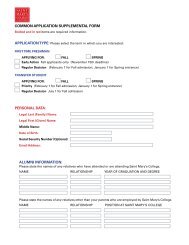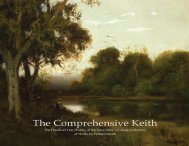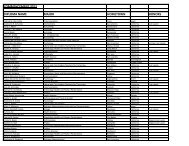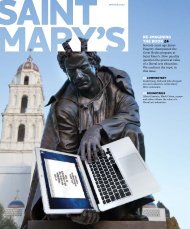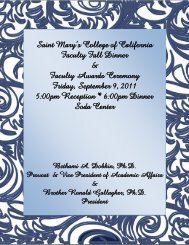History Curriculum131 Colonial History <strong>of</strong> the United StatesA study <strong>of</strong> three “experimental” societies in the New World: the “holyexperiment” <strong>of</strong> the Quakers in Pennsylvania, the Puritan “city on a hill”in Massachusetts, and the plantation society <strong>of</strong> the Anglicans in Virginia.Emphasis is placed on religious, cultural, social, and political developmentswithin the colonies, with due attention to the British imperial andmercantile systems.Offered in alternate years.132 The American Revolution and the Early RepublicA study <strong>of</strong> the American Revolution, the Confederation period, theratification <strong>of</strong> the Constitution, and the Federalist decade. Emphasis isplaced on intellectual, political, economic, military, and diplomatic history,as well as on major historical interpretations <strong>of</strong> the periods covered.Offered in alternate years.133 Era <strong>of</strong> the Civil War and ReconstructionAn examination <strong>of</strong> American society and politics from the Age <strong>of</strong>Jackson to the end <strong>of</strong> Reconstruction. Major focus is on the Civil Waras the great crisis <strong>of</strong> national unity: the economic, political, social, andcultural forces that brought it on, and the new nation that emerged inits aftermath.Offered in alternate years.134 Recent History <strong>of</strong> the United StatesA study <strong>of</strong> the Twenties, the origins <strong>of</strong> the Great Depression, the NewDeal, America during World War II, and the postwar periods includingthe Civil Rights Movement, Watergate, the Reagan revolution, and theBush and Clinton years. Emphasis is placed on social, cultural, and literaryhistory. The course concentrates on domestic developments rather thanon foreign affairs.Offered in alternate years.135 United States Foreign Relations: 1898 to the PresentAn examination <strong>of</strong> the nation’s foreign affairs from the rise <strong>of</strong> imperialism inthe late 19th century through the challenge <strong>of</strong> war and peace in the 20thcentury. U.S. policy is considered as the result <strong>of</strong> both domestic and foreigneconomic, political, and psychological influences.Offered in alternate years.136 Immigration and Ethnic Relationsin American HistoryA study <strong>of</strong> immigrant groups in the United States from the Revolution tothe present, assessing their response to and impact upon American society.Topics to be discussed include the foreign background <strong>of</strong> immigration, theproblems <strong>of</strong> adjustment, assimilation and mobility in comparative perspective,ethnic politics and culture, nativism, Black migration, and the “meltingpot” vs. “cultural pluralism” description <strong>of</strong> America.Offered in alternate years.137 United States History in Comparative PerspectiveThis course integrates American history into an international framework<strong>of</strong> analysis by exploring similarities and differences between the UnitedStates’ historical development and that <strong>of</strong> other nations. Topics includecomparative approaches to indigenous cultures, colonization, revolutionand nationalism, political systems, the frontier, slavery and race, reform,immigration, industrialism, and the welfare state.Offered in alternate years.138 American Culture since the Civil WarThis course draws upon sources from American popular and high culturesince the Civil War in order to examine key ideas, attitudes, and forms<strong>of</strong> expression in 19th- and 20th-century America and suggests theirrelationship to the changing social context.Offered in alternate years.139 History <strong>of</strong> Women in AmericaA study <strong>of</strong> the changing roles and status <strong>of</strong> American women from theColonial period to the present. Topics considered include work andfamily life, the legal status <strong>of</strong> women, education, reform movements,and the campaigns for suffrage and women’s rights.Offered in alternate years.140 African-American History: 1619 to 1865A study <strong>of</strong> the role and contribution <strong>of</strong> African-Americans in the development<strong>of</strong> United States history from the colonial era to the Civil War.The course analyzes the concept and practice <strong>of</strong> slavery, the place <strong>of</strong> theAfrican-American in the U.S. Constitution, the American colonial and postcolonialeconomy and the Black peoples, the factors that caused the CivilWar and American domestic socio-political history.Offered in alternate years.141 African-American History: 1865 to the PresentA study <strong>of</strong> the political and social consequences <strong>of</strong> African-Americanemancipation from the Reconstruction era onward. The course emphasizesthe African-American search for positive ways to implement constitutionaland democratic principles. It also analyzes the importance andimpact <strong>of</strong> “protest” as a socio-political phenomenon and culminates withthe study <strong>of</strong> new forms <strong>of</strong> activism in the African-American community.Offered in alternate years.142 <strong>California</strong>A study <strong>of</strong> <strong>California</strong> from its pre-contact beginnings to the present; itstransformation from an Indian society to an ignored Spanish outpost, toMexican domination, and finally to one <strong>of</strong> the fastest-growing states inthe nation. The course deals with problems <strong>of</strong> change and growth as theGolden State enters the next century.Offered in alternate years.150 Problems and Issues in Latin American HistoryAnalysis <strong>of</strong> a selected theme, problem, era, or region not covered bythe regular <strong>of</strong>ferings <strong>of</strong> the department. Topics are announced prior toregistration each semester.1<strong>09</strong>
Curriculum History151 Contemporary Latin AmericaA survey <strong>of</strong> the history <strong>of</strong> the continent in the 19th and 20th centuries,focusing on the elusive search for democracy, the development <strong>of</strong>capitalism, and the various alternatives proposed by reformist andrevolutionary movements and government over the decades.Offered in alternate years.152 Latin American RevolutionsA comparative study <strong>of</strong> the history <strong>of</strong> the major revolutionary movementsand governments <strong>of</strong> Latin America in the 20th century — Mexico,Cuba, Chile, and Nicaragua — focusing on their origins, the composition<strong>of</strong> the participants, the international context <strong>of</strong> their development, andthe goals, successes, and failures involved.Offered in alternate years.153 Latin America: Race and SocietyThe course traces the African heritage <strong>of</strong> Latin America, putting specialemphasis on the Caribbean, Brazil, the Pacific coast <strong>of</strong> Central Americaand Venezuela, and the small countries <strong>of</strong> Surinam and Guyana. Itexamines the origins <strong>of</strong> the African population <strong>of</strong> Latin America, theircontribution to the culture and economy <strong>of</strong> the region, and the continuingstruggle against racism and discrimination.Offered in alternate years.154 Latin America and the United StatesOver two centuries, relations between Latin America and the UnitedStates have varied from mutual admiration to distrust. Tracing theserelations from the Monroe Doctrine to the present involvement <strong>of</strong> theUnited States in Central America, the course explores the questions:How has Latin America reacted to the United States’ pursuit <strong>of</strong> itsnational interests and security in the region? What degree <strong>of</strong> successhas the United States achieved in its objectives?Offered in alternate years.155 Latin American Environmental HistoryAn introduction to the history and relations between humans and theirenvironment in Latin America from the pre-Columbian era, through thecolonial period and independence, and into the 20th century. Specialemphasis is placed on Mexico, Brazil, and Central America to exploretopics such as agriculture and environment, war and ecology, the historyand fate <strong>of</strong> the tropical rainforests, industrialization and environmentaldestruction, development and conservation, and sustainable alternativesin the 21st century.Offered in alternate years.160 Problems and Issues in Asian HistoryAnalysis <strong>of</strong> a selected theme, problem, era, or region not covered bythe regular <strong>of</strong>ferings <strong>of</strong> the department. Topics are announced prior toregistration each semester.161 Modern JapanThe course begins in 1603 with the establishment <strong>of</strong> the TokugawaShogunate and ends with present-day Japan. Emphasis is placed onpolitical, economic, cultural, and social history. Special attention is givento the “Japanese character” as it evolved historically. A major theme <strong>of</strong>the course is Japan’s success in modernizing or Westernizing.Offered in alternate years.162 Modern ChinaThe course begins in 1644 with the establishment <strong>of</strong> the Qing (Manchu)Dynasty and ends with present-day Communist China. Emphasis isplaced on political, economic, cultural, and social history. The mainthemes <strong>of</strong> the course are China’s struggle to modernize, and reactionand revolution in late 19th- and 20th-century China.Offered in alternate years.170 Problems and Issues in African HistoryAnalysis <strong>of</strong> a selected theme, problem, era, or region not covered bythe regular <strong>of</strong>ferings <strong>of</strong> the department. Topics are announced priorto registration each semester.171 African History to 1850A study <strong>of</strong> human origins in Africa, Black migration, the expansion <strong>of</strong>Islam in Africa, the slave trade, and the rise <strong>of</strong> ancient kingdoms <strong>of</strong>Ghana, Mali, Zulu. The course searches for and establishes the culturalidentity <strong>of</strong> Africa before slavery, and the influence <strong>of</strong> ancient Egyptian,Nubian, and Meroe cultures on subsequent sub-Saharan civilization.Offered in alternate years.172 African History Since 1850A study <strong>of</strong> the major themes <strong>of</strong> state building, Islamic revolutions,colonialism, nationalism and pan-Africanism, the role <strong>of</strong> the military inrecent decades, African decolonization and economic development inthe context <strong>of</strong> the modern world. The course emphasizes the development<strong>of</strong> African contemporary culture in comparison with that <strong>of</strong> selectnations and regions <strong>of</strong> the developed world.Offered in alternate years.197 Special StudyAn independent study or research course in an area not <strong>of</strong>fered bythe department. Permission from the instructor and department chairis required.199 Special Study — HonorsAn independent study or research course for upper-division majorswith at least a B average in history. Permission from the instructor andthe department chair is required.110


